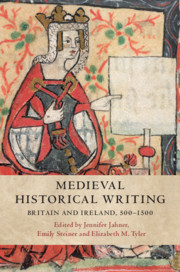Book contents
- Medieval Historical Writing
- Medieval Historical Writing
- Copyright page
- Contents
- Illustrations
- Notes on Contributors
- Abbreviations
- General Introduction
- Part I Time
- Chapter 1 Gildas
- Chapter 2 Monastic History and Memory
- Chapter 3 Apocalypse and/as History
- Chapter 4 The Brut: Legendary British History
- Chapter 5 Genealogies
- Chapter 6 Anglo-Saxon Futures: Writing England’s Ethical Past, Before and After 1066
- Chapter 7 Pagan Histories/Pagan Fictions
- Part II Place
- Part III Practice
- Part IV Genre
- Bibliography
- Index
Chapter 5 - Genealogies
from Part I - Time
Published online by Cambridge University Press: 19 December 2019
- Medieval Historical Writing
- Medieval Historical Writing
- Copyright page
- Contents
- Illustrations
- Notes on Contributors
- Abbreviations
- General Introduction
- Part I Time
- Chapter 1 Gildas
- Chapter 2 Monastic History and Memory
- Chapter 3 Apocalypse and/as History
- Chapter 4 The Brut: Legendary British History
- Chapter 5 Genealogies
- Chapter 6 Anglo-Saxon Futures: Writing England’s Ethical Past, Before and After 1066
- Chapter 7 Pagan Histories/Pagan Fictions
- Part II Place
- Part III Practice
- Part IV Genre
- Bibliography
- Index
Summary
This chapter looks at the popular medieval historical genre of genealogy in both theory and practice. First it provides an overview of the divergent theories of and attitudes toward genealogy that inform medieval thinking. The significance of genealogy makes itself known in all arenas of medieval culture, from the political to the pious: for example, issues of lineage, succession, and inheritance were crucial to the structure of feudal society, while the biblical tradition of listing lines of prophets facilitated an unbroken genealogical narrative from Creation to the Christian era, reinforcing allegorical readings of salvation history. The main focus of this chapter will be on how genealogy shapes the writing of history. Nationalising histories from Geoffrey of Monmouth through Mannyng’s Chronicle, chronicles of noble families, and the royal genealogical rolls popular during the Wars of the Roses all share certain aims: to assimilate and lay claim to the legendary past as a way of authorizing the present, to shape particular views of national history, and to explore questions of nobility and prestige, often to propagandistic ends. The chapter also considers genealogy in practice as a material genre, looking at how visual genealogies such as pedigrees and genealogical rolls, both largely diagrammatic forms, present their information and ideological claims. Finally, the chapter aims to provide an overview of the uses and abuses of genealogy in medieval England with a broad historical spread.
- Type
- Chapter
- Information
- Medieval Historical WritingBritain and Ireland, 500–1500, pp. 84 - 100Publisher: Cambridge University PressPrint publication year: 2019



